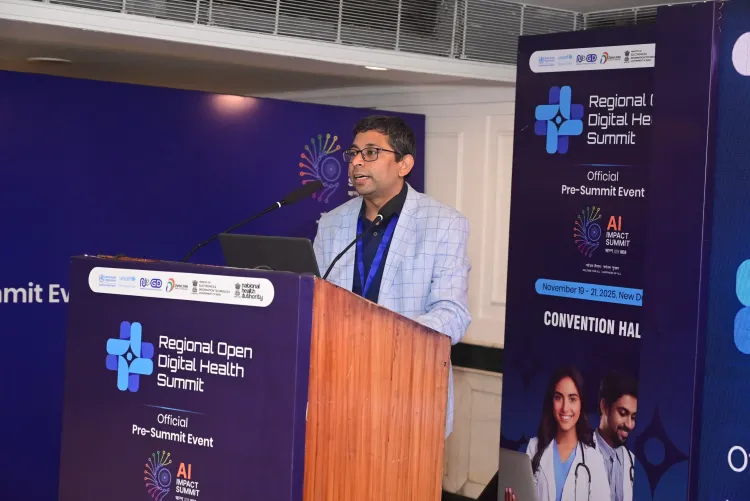Is Technology Crucial for Achieving Universal Health Coverage in India?

Synopsis
Key Takeaways
- Technology is crucial for universal health coverage.
- Digital health should be viewed as an investment.
- Collaboration among various sectors is essential.
- Sustainable financing is necessary for digital health transformation.
- Countries face common challenges in digital health progress.
New Delhi, Nov 22 (NationPress) Vikram Pagaria, the Director of the Ayushman Bharat Digital Mission (ABDM) at the National Health Authority (NHA), emphasized on Saturday that technology plays a critical role in realizing universal health coverage in India.
His remarks were made during the Regional Open Digital Health Summit 2025 held in the capital.
This three-day summit gathered leaders from government sectors alongside specialists from international organizations and the health technology industry to establish a collaborative framework for Digital Health and artificial intelligence (AI) in the South-East Asia region.
Pagaria underlined the significance of viewing digital health as an investment rather than an expense.
He stated, "Digital health is an investment, not a cost, and is essential in achieving universal health coverage."
He highlighted the potential of technology to address pressing challenges, including shortages of healthcare professionals, and to extend services to remote rural areas, according to the NHA official.
Meredith Dyson, Regional Health Specialist at UNICEF for Health Systems Strengthening, remarked, "Technology alone does not equal transformation. True impact comes from addressing real-world needs, empowering frontline workers, protecting rights, and ensuring equity."
She stressed the importance of interoperability from the outset and the need for country-specific strategies aligned with the principles of Digital Public Infrastructure.
Abhishek Singh, Additional Secretary at the Ministry of Electronics and Information Technology and CEO of the IndiaAI Mission, urged the creation of a secure, inclusive, and globally relevant AI-enabled health system through collaborative efforts among governments, states, hospitals, tech innovators, academic institutions, the World Health Organization, and nations in the Global South.
Karthik Adapa, Regional Advisor for Digital Health at the World Health Organization for the South-East Asia Region, distinguished between integration and interoperability.
He pointed out crucial elements of a resilient digital health ecosystem, including infrastructure, Digital Public Infrastructures, applications, governance, and capacity development.
Experts also discussed the need for a sustainable financing model as a vital prerequisite for the transformation of digital health, particularly with the challenges of shrinking fiscal resources, escalating healthcare costs, and diminishing global aid.
Countries such as India, Bangladesh, Maldives, Nepal, Sri Lanka, Bhutan, Thailand, and Timor-Leste face shared hurdles like fragmented funding channels, reliance on donors, and inadequate long-term budgeting, which threaten to stall the progress of digital health initiatives.









